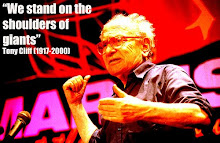
All four volumes of Tony Cliff's biography of Trotsky are now online, at the Marxists' Internet Archive, as well as two volumes of his Lenin biography. This is a major advance in getting Cliff's work online, so a big thank you to those involved. And thanks to the Histomatist blog for alerting me to the news, in the post 'Tony Cliff on Lenin and Trotsky'.
There's a useful chapter about the writing of these biographies in Cliff's memoir, 'A World to Win'. He comments that volume 1, 'Building the Party', is the cornerstone of the Lenin biography. It is basically the nearest you'll get to a definitive manual on building a revolutionary party. Not, it ought to be stressed, because any of us can mechanically apply what the Bolsheviks did in pre-1917 Russia in radically different conditions. Cliff recognised the differences required, but he was also exceptional at identifying the general lessons that could be derived from Lenin's experiences in taking the Bolsheviks from small underground circle to leadership of the only successful workers' revolution in history.
Cliff also suggested that it is the final volume, covering the dark years 1927 (expulsion from the Communist Party) to 1940 (assassination by a Stalinist agent), that was most important in his Trotsky biography. This was partly because it was unique in being the only volume of either biography to cover years Cliff had personal recollection of. He became a Marxist in British-ruled Palestine in around 1933 and was a dedicated Trotskyist - admittedly in a tiny group on the fringes of the Trotskyist movement to begin with - from the mid-1930s.
He also felt especially strongly about the book - titled, poetically, 'The Darker the Night, the Brighter the Star' - because he admired immensely the courage and resilience shown by Trotsky in these years, and felt pity and sorrow when contemplating what he endured. It is a powerful personal tribute - to someone who sustained himself and his political commitment through Nazism and Stalinism - as well as an acute political analysis. These were the years of - to cite just one important area - Trotsky's astute analysis of the rise of Hitler to power in Germany, which Cliff regarded as amongst the greatest of Trotsky's contributions to the Marxist tradition.
Lenin volume 1 was surely also very personally relevant - indeed I've heard it suggested that many passages could easily be interpreted as autobiography, as Cliff is to an extent writing about his efforts (in the early to mid 70s) to build revolutionary organisation through the International Socialists (which became the SWP on 1 January 1977). His own preocupation with turning IS into a disciplined, cohesive revolutionary party was the motor behind his devouring of Lenin's work - and, furthermore, writing a multi-volume biography - from 1968 onwards. His very short piece on democratic centralism in summer 1968 effectively marked the beginning of a massive study of the Bolsheviks, and also the start of a determined effort to re-orient what was then the International Socialists.
The Lenin biography was completed by the end of the 1970s and for generations of SWP members it served as a valuable guide to a hugely important era in revolutionary history and a source of insight into party building, the nature of revolution, and some knotty questions around Leninism and the common charge that the seeds of Stalinism could be found in the Bolshevik Party. The biography, published during the Cold War, was a superb refutation of precisely that charge.
The Trotsky biography came later, between 1988 and 1993. Cliff acknowledged in his memoir that he'd rather not have had the time to write either biography. It was the onset of the downturn in the mid-1970s that facilitated the Lenin biography - such a task would have been impossible in the heady days of revolt in the late 60s and early 70s. Likewise he could only devote such time to Trotsky because of the relatively low levels of resistance and struggle during the period in which wrote it, though he always took an active interest in contemporary politcs and day-to-day party building.
It was appropriate that the Berlin Wall fell and the Soviet Union collapse during this latter period: events that vindicated Cliff's pioneering analysis of forty years earlier, and which created an opening for the rediscovery of the tradition of which Trotsky was such a magnificent representative.
That tradition was a world away from the monstrosities of Stalinism. It was, and is, a tradition of socialism from below, with the self-activity of the working class at its core. Today, with capitalism in its deepest crisis since Trotsky's final struggle (and Cliff's formative years), the need for us to carry forward that thread of genuine socialism is profound. The biographies of Lenin and Trotsky are an aid to us in the project of strengthening revolutionary socialism in the 21st century.
A full index of Cliff's online writings - including the biographies - can be found here: www.marxists.org/archive/cliff/

No comments:
Post a Comment